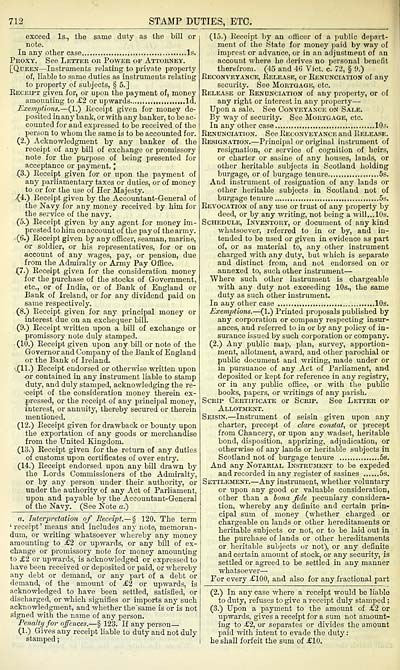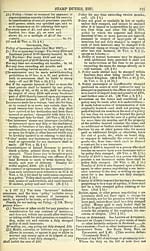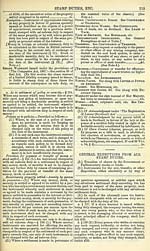Download files
Complete book:
Individual page:
Thumbnail gallery: Grid view | List view

712
STAMP DUTIES, ETC.
exceed Is., the same duty as the bill or
note.
In any other case Is.
Proxy. See Letter or Power of Attorney.
[Queen — Instruments relating to private property
of, liable to same duties as instruments relating
to property of subjects, § 5.]
Receipt given for, or ujjon the payment of, money
amounting to £2 or upwards Id.
Exemptions. — (1.) Receipt given for money de-
posited in any bank, or with any banker, to be ac-
counted for and expressed to be received of the
person to whom the same is to be accounted for.
(2.) Acknowledgment by any banker of the
receipt of any bill of exchange or promissory
note for the purpose of being presented for
acceptance or payment. \
(S.) Receipt given for or upon the payment of
any pai-liamentary taxes or duties, or of money
to or for the use of Her Majesty.
y(4.) Receipt given by the Accountant-Geueral of
the Navy for any money received by him for
the service of the navy.
(5.) Receipt given by any agent for money im-
prcsted to him on account of the pay of the army.
(6.) Receipt given by any officer, seaman, marine,
or soldier, or his representatives, for or on
account of any wages, pay, or pension, due
from the Admiralty or Army Pay Office.
(7.) Receipt given for the consideration money
for the purchase of the stocks of Government,
etc., or of India, or of Bank of England or
Bank of Ireland, or for any dividend paid on
same respectively.
(8.) Receipt given for any principal money or
interest due on an exchequer bill.
(9.) Receipt written upon a bill of exchange or
promissoi-y note duly stamped.
(10.) Receipt given upon any bill or note of the
Governor and Company of the Bank of England
or the Bank of Ireland.
.,(11.) Receipt endorsed or otherwise written upon
-or contained in any instrument liable to stamp
duty, and duly stamped, acknowledging the re-
'ceipt of the consideration money therein ex-
pressed, or the receipt of any principal money,
interest, or annuity, thereby secured or therein
mentioned.
(12.) Receipt given for drawback or bounty upon
the exportation of any goods or merchandise
from the United Kingdom.
(13.) Receipt given for the return of any duties
of customs upon certificates of over entry.
(14.) Receipt endorsed upon any bill drawn by
the Lords Commissioners of the Admiralty,
or by any person under their authority, or
under the authority of any Act of Parliament,
upon and payable by the Accountant-General
of the Navy. (See Note a.)
a. Interpretation of Receipt. — § 120. The term
' receipt ' means and includes any note, memoran-
dum, or writing whatsoever whereby any money
amounting to £2 or upwards, or any bill of ex-
change or promissory note for money amounting
to £2 or upwards, is acknowledged or expressed to
have been received or dep)osited or paid, or whereby
any debt or demand, or any part of a debt or
demand, of the amount of £2 or upwards, is
acknowledged to have been settled, satisfied, or
discharged, or which signifies .or imports any such
acknowledgment, and whether the'same is or is not
signed with the name of any person.
Penalty for offences.— % 123. If any person—
(1.) Gives any receipt liable to duty and not duly
stamped ;
(15.) Receipt by an officer of a public depart-
ment of the State for money j^aid by way of
imprest or advance, or in an adjustment of an
account where he derives no personal benefit
therefrom. (45 and 46 Vict. c. 72, § 0.)
Reconveyance, Release, or Renunciation of any
security. See Mortgagic, etc.
Release or Renunciation of any property, or of
any right or interest in any property —
Upon a sale. See OoNVEYA^■CE on Sale.
By way of security. See Mortgage, etc.
In any other case 10s.
Renunciation. See Reconveyance and Release.
Resignation. — Principal or original instrument of
resignation, or service of cognition of heirs,
or charter or sasine of any houses, lands, or
other heritable subjects in Scotland holding
burgage, or of burgage tenure 5s.
And instrument of resignation of any lands or
other heritable subjects in Scotland not of
burgage tenure 5s.
Revocation of any use or trust of any property by
deed, or by any writing, not being a will. ..10s.
Schedule, Inventory, or document of any kind
whatsoever, referred to in or by, and in-
tended to be used or given in evidence as part
of, or as material to, any other insti-ument
charged with any duty, but which is separate
and distinct from, and not endorsed on or
annexed to, such other instrument —
Where such other instrument is chargeable
with any duty not exceeding 10s., the same
duty as such other instrument.
In any other case 10s.
Exemptions. — (1.) Printed proposals published by
any corporation or company respecting insur-
ances, and referred to in or by any policy of in-
surance issued by such corporation or company.
(2.) Any public map, plan, survey, apportion-
ment, allotment, award, and other parochial or
public document and writing, made under or
in pui'suance of any Act of Parliament, and
deposited or kept for reference in any registry,
or in any public office, or with the public
books, papers, or writings of any parish.
Scrip Certificate or Scrip. See Letter of
Allotment.
Seisin. — Instrument of seisin given upon any
charter, precept of dare constat., or precept
from Chancery, or upon any wadset, heritable
bond, disposition, apprizing, adjudication, or
otherwise of any lands or heritable subjects iu
Scotland not of burgage tenure 5s.
And any Notarial Instrument to be expeded
and recorded in any register of sasines 5s.
Settlement. — Any instrument, whether voluntary
or upon any good or valuable consideration,
other than a hona fide pecuniary considera-
tion, whereby any definite and certain prin-
cipal sum of money (whether charged or
chargeable on lands or other hereditaments or
heritable subjects or not, or to be laid out in
the purchase of lands or other hereditaments
or heritable subjects or not), or any definite
and certain amount of stock, or any security, is
settled or agreed to be settled in any manner
whatsoever—
For every £100, and also for any fractional part
(2.) In any case where a receipt would be liable
to duty, refuses to give a receipt duly stamped ;
(3.) Upon a payment to the amount of £2 or
upwards, gives a receipt for a sum not amount-
ing to £2, or separates or divides the amount
paid with intent to evade the duty :
he shall forfeit the sum of £10.
STAMP DUTIES, ETC.
exceed Is., the same duty as the bill or
note.
In any other case Is.
Proxy. See Letter or Power of Attorney.
[Queen — Instruments relating to private property
of, liable to same duties as instruments relating
to property of subjects, § 5.]
Receipt given for, or ujjon the payment of, money
amounting to £2 or upwards Id.
Exemptions. — (1.) Receipt given for money de-
posited in any bank, or with any banker, to be ac-
counted for and expressed to be received of the
person to whom the same is to be accounted for.
(2.) Acknowledgment by any banker of the
receipt of any bill of exchange or promissory
note for the purpose of being presented for
acceptance or payment. \
(S.) Receipt given for or upon the payment of
any pai-liamentary taxes or duties, or of money
to or for the use of Her Majesty.
y(4.) Receipt given by the Accountant-Geueral of
the Navy for any money received by him for
the service of the navy.
(5.) Receipt given by any agent for money im-
prcsted to him on account of the pay of the army.
(6.) Receipt given by any officer, seaman, marine,
or soldier, or his representatives, for or on
account of any wages, pay, or pension, due
from the Admiralty or Army Pay Office.
(7.) Receipt given for the consideration money
for the purchase of the stocks of Government,
etc., or of India, or of Bank of England or
Bank of Ireland, or for any dividend paid on
same respectively.
(8.) Receipt given for any principal money or
interest due on an exchequer bill.
(9.) Receipt written upon a bill of exchange or
promissoi-y note duly stamped.
(10.) Receipt given upon any bill or note of the
Governor and Company of the Bank of England
or the Bank of Ireland.
.,(11.) Receipt endorsed or otherwise written upon
-or contained in any instrument liable to stamp
duty, and duly stamped, acknowledging the re-
'ceipt of the consideration money therein ex-
pressed, or the receipt of any principal money,
interest, or annuity, thereby secured or therein
mentioned.
(12.) Receipt given for drawback or bounty upon
the exportation of any goods or merchandise
from the United Kingdom.
(13.) Receipt given for the return of any duties
of customs upon certificates of over entry.
(14.) Receipt endorsed upon any bill drawn by
the Lords Commissioners of the Admiralty,
or by any person under their authority, or
under the authority of any Act of Parliament,
upon and payable by the Accountant-General
of the Navy. (See Note a.)
a. Interpretation of Receipt. — § 120. The term
' receipt ' means and includes any note, memoran-
dum, or writing whatsoever whereby any money
amounting to £2 or upwards, or any bill of ex-
change or promissory note for money amounting
to £2 or upwards, is acknowledged or expressed to
have been received or dep)osited or paid, or whereby
any debt or demand, or any part of a debt or
demand, of the amount of £2 or upwards, is
acknowledged to have been settled, satisfied, or
discharged, or which signifies .or imports any such
acknowledgment, and whether the'same is or is not
signed with the name of any person.
Penalty for offences.— % 123. If any person—
(1.) Gives any receipt liable to duty and not duly
stamped ;
(15.) Receipt by an officer of a public depart-
ment of the State for money j^aid by way of
imprest or advance, or in an adjustment of an
account where he derives no personal benefit
therefrom. (45 and 46 Vict. c. 72, § 0.)
Reconveyance, Release, or Renunciation of any
security. See Mortgagic, etc.
Release or Renunciation of any property, or of
any right or interest in any property —
Upon a sale. See OoNVEYA^■CE on Sale.
By way of security. See Mortgage, etc.
In any other case 10s.
Renunciation. See Reconveyance and Release.
Resignation. — Principal or original instrument of
resignation, or service of cognition of heirs,
or charter or sasine of any houses, lands, or
other heritable subjects in Scotland holding
burgage, or of burgage tenure 5s.
And instrument of resignation of any lands or
other heritable subjects in Scotland not of
burgage tenure 5s.
Revocation of any use or trust of any property by
deed, or by any writing, not being a will. ..10s.
Schedule, Inventory, or document of any kind
whatsoever, referred to in or by, and in-
tended to be used or given in evidence as part
of, or as material to, any other insti-ument
charged with any duty, but which is separate
and distinct from, and not endorsed on or
annexed to, such other instrument —
Where such other instrument is chargeable
with any duty not exceeding 10s., the same
duty as such other instrument.
In any other case 10s.
Exemptions. — (1.) Printed proposals published by
any corporation or company respecting insur-
ances, and referred to in or by any policy of in-
surance issued by such corporation or company.
(2.) Any public map, plan, survey, apportion-
ment, allotment, award, and other parochial or
public document and writing, made under or
in pui'suance of any Act of Parliament, and
deposited or kept for reference in any registry,
or in any public office, or with the public
books, papers, or writings of any parish.
Scrip Certificate or Scrip. See Letter of
Allotment.
Seisin. — Instrument of seisin given upon any
charter, precept of dare constat., or precept
from Chancery, or upon any wadset, heritable
bond, disposition, apprizing, adjudication, or
otherwise of any lands or heritable subjects iu
Scotland not of burgage tenure 5s.
And any Notarial Instrument to be expeded
and recorded in any register of sasines 5s.
Settlement. — Any instrument, whether voluntary
or upon any good or valuable consideration,
other than a hona fide pecuniary considera-
tion, whereby any definite and certain prin-
cipal sum of money (whether charged or
chargeable on lands or other hereditaments or
heritable subjects or not, or to be laid out in
the purchase of lands or other hereditaments
or heritable subjects or not), or any definite
and certain amount of stock, or any security, is
settled or agreed to be settled in any manner
whatsoever—
For every £100, and also for any fractional part
(2.) In any case where a receipt would be liable
to duty, refuses to give a receipt duly stamped ;
(3.) Upon a payment to the amount of £2 or
upwards, gives a receipt for a sum not amount-
ing to £2, or separates or divides the amount
paid with intent to evade the duty :
he shall forfeit the sum of £10.
Set display mode to: Large image | Transcription
Images and transcriptions on this page, including medium image downloads, may be used under the Creative Commons Attribution 4.0 International Licence unless otherwise stated. ![]()
| Scottish Post Office Directories > Towns > Edinburgh > Post Office Edinburgh and Leith directory > 1883-1884 > (748) |
|---|
| Permanent URL | https://digital.nls.uk/83330633 |
|---|
| Description | Directories of individual Scottish towns and their suburbs. |
|---|
| Description | Around 700 Scottish directories published annually by the Post Office or private publishers between 1773 and 1911. Most of Scotland covered, with a focus on Edinburgh, Glasgow, Dundee and Aberdeen. Most volumes include a general directory (A-Z by surname), street directory (A-Z by street) and trade directory (A-Z by trade). |
|---|


